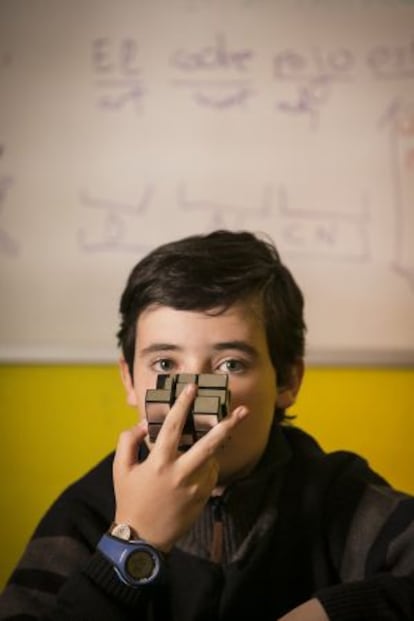Paying the price for being gifted
Few Spanish schools are able to assess bright children’s needs


Raúl was five when one of his teachers suggested to his mother, María José Molino, that he take a test to establish whether he was gifted.
“She told me she had never come across such an intelligent child, but I didn’t make too much of it, because I was comparing him to his brother, who is three years older [who was subsequently also found to have an exceptionally high IQ],” she says from her home in Mérida, in the western region of Extremadura.
Two years later, in 2010, another teacher suggested Raúl undergo an IQ test, and this time he did. And so began a five-year legal battle with the regional government over the boy’s education.
The World Health Organization estimates that two percent of humanity is gifted. But Spain has yet to implement methods to detect this in schools, and as a result, the parents of gifted children rarely find out. And if they do – after paying for tests themselves – they often come up against regional education departments, which tend to resist giving such children a special education. This may cause serious psychological problems, as well as failing to put their talent to good use.
Molino shows the results of the first test the regional government of Extremadura gave Raúl. It is one page long, with 17 lines of text confirming that the boy has an IQ of 124, but that he is not gifted (that requires a score of 130 or more).
Then she brings out another report carried out by specialists in IQ testing. It is 100 pages long, and concludes that Raúl is gifted, and that he already thinks like a 14-year-old, and in some subjects like a 16-year-old. It recommends he be moved up at least one academic year.
“We didn’t know anything about this. We went to see the specialists because my son’s school told us that the regional assessment team had basically rushed through the job just to get rid of the problem, and that the boy needed to be independently evaluated in Valladolid. We spent around €1,500 what with the stay and the report, which cost €800.”
The parents then hit a bureaucratic brick wall. The Extremadura education department refused to accept the independent assessment of the boy’s intelligence. “So the regional government’s own team had to carry out another test. That took four months.”
The World Health Organization estimates that two percent of humanity is gifted. But Spain has yet to implement methods to detect this in schools
In the meantime, Raúl was getting bored in class. “The teacher suggested he take books home to read, and that’s what he did,” says Raúl’s mother. Finally, the regional government’s experts concluded that the boy was an “exceptional performer in language and mathematics, recommending that Raúl move up a year in both subjects. He was, and got straight As in both. But at the end of the academic year the school principal told the mother that he had been prohibited from including those scores in Raúl’s official report card, and the following year he was forced to take the same classes again.
“He started to go through a bad time. He had nightmares and asthma attacks. He came out in a rash and would tell me that he hated his life and hated going to school. I took him to see a pediatrician, who sent me to a psychologist, who ratified that the boy was gifted and that he was suffering from anxiety. We sent the medical report to the education department, but they took no notice. Raúl himself sent them a letter saying he had done everything required of him and to please not make him repeat the year. But they insisted that he was not gifted. That was when we decided to take legal action,” says Molina. By now it was 2013, and Raúl was 10 years old.
In June of 2014, a provincial court ruled that the regional education department had failed to carry out the tests on Raúl properly. It assigned an independent expert, Carmen Sanz, to examine the boy, who concluded that at the age of 11 he had an IQ of 135 and the mental age of a 14-year-old. “He is gifted,” concluded the court’s report, adding that he should move up a year “as soon as possible.” Holding the boy back, says Sanz, “has had a negative effect on his educational and emotional development that is seriously affecting his psychological wellbeing.”

Based on this report, the judge said that in September Raúl must move up a year and that a support teacher should help him prepare for it. But the regional government decided to appeal the ruling. After a second court overturned the appeal, the regional government took the matter to the Supreme Court of Extremadura, alleging that Raúl “may not be treated well by his new classmates, who are older than him.” Furthermore, it said that assigning a special teacher to help Raúl prepare was “an unnecessary expense.”
Finally, on January 27 of this year, the Supreme Court ratified the original ruling in favor of Raúl’s family and ordered the regional government to pay the legal fees. The specialized center in Valladolid had established five years ago that Raúl was gifted. “Five wasted years,” says Raúl’s mother.
Raúl’s parents figure they have spent around €30,000 on this battle against regional education authorities.
“I think this is all because they don’t have the resources, the support teachers… but what really upsets me is the regional government’s insensitivity, doing legal battle against a child just because they refuse to recognize that they got it wrong the first time. How many other children must be in the same situation? I just hope that my child is the last.”
I think this is all because they don’t have the resources, the support teachers…”
María José Molino
“They take advantage of your ignorance, because how are you supposed to know about these kinds of things?” she adds. “They know that you’re afraid of them, because they have your child for six hours a day. If we’d known what we were going to have to go through, we might have given up. We’ve been through a terrible time. Raúl used to say to me: ‘I wish I wasn’t so intelligent.’ He ended up believing he was being punished for it.”
Molino and her husband have spent five years reading up on the subject and talking to other parents in the same situation. In the process they contacted Isidro Padrón, president of a Canary Islands-based foundation that works with gifted children. He has spent more than 20 years locked in successive legal battles with his local government over the education of his three gifted children. In 2012, the Spanish Supreme Court ruled that independent IQ tests are valid evidence and must be accepted by regional education authorities when deciding what measures to provide for gifted children.
Raúl is happy now that he has finally been bumped up a grade. He has stopped having nightmares, and the rash has cleared up, but it hasn’t been easy. “One mother said to me: ‘Your son is gifted? How scary!’, while another mother stopped her son from seeing mine,” says Molino.
Tu suscripción se está usando en otro dispositivo
¿Quieres añadir otro usuario a tu suscripción?
Si continúas leyendo en este dispositivo, no se podrá leer en el otro.
FlechaTu suscripción se está usando en otro dispositivo y solo puedes acceder a EL PAÍS desde un dispositivo a la vez.
Si quieres compartir tu cuenta, cambia tu suscripción a la modalidad Premium, así podrás añadir otro usuario. Cada uno accederá con su propia cuenta de email, lo que os permitirá personalizar vuestra experiencia en EL PAÍS.
¿Tienes una suscripción de empresa? Accede aquí para contratar más cuentas.
En el caso de no saber quién está usando tu cuenta, te recomendamos cambiar tu contraseña aquí.
Si decides continuar compartiendo tu cuenta, este mensaje se mostrará en tu dispositivo y en el de la otra persona que está usando tu cuenta de forma indefinida, afectando a tu experiencia de lectura. Puedes consultar aquí los términos y condiciones de la suscripción digital.








































